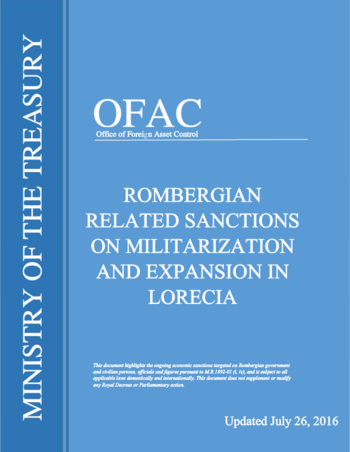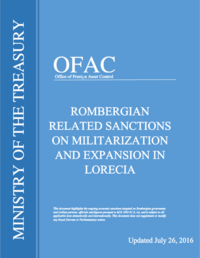International sanctions during the Western Tundra crisis

| Part of on the |
| Tundra Crisis of 2016 |
|---|
 |
|
|
The Rombergian claims on the Western Tundra, which were asserted on Rombergian national television on the 21st of July, 2016, after secret negotiations with Glisandia had concluded, prompted a number of governments across Astyria to apply sanctions against individuals, entities and high-ranking government officials from Romberg. Sanctions were approved by Aquitayne, Riysa, and East Astyrian Treaty Alliance nations, led by the Blackhelm Confederacy, and other countries and international organizations. Romberg responded with sanctions aimed at Aquitayne specifically, targeting high-ranking government officials assets in Romberg as well as banning the export of Rombergian oil to Aquitayne.
The full effect of the sanctions against Romberg have not yet been seen, but it has been correlated to a seizure of over $900 million NSD in Aquitaynian financial accounts, as well as a 1,337 point drop in the Rombergian Stock Exchange a day after Aquitaynian sanctions were imposed, leading to a massive sell-off of Rombergian international businesses, specifically those operating in the import/export markets. When EATA sanctions were announced, the Rombergian stock exchange dropped a further 1,892 points after recovering slightly from the Aquitaynian sanctions. The value of the Rombergian Krona also dropped drastically, lowering to Ǩ4.25 to $1 NSD, but has since recovered slightly to Ǩ2.58 to $1 NSD. However, after Riysian sanctions and the seizure of Rombergian assets in Riysa, speculative attacks on the Krona by investors across Astyria led to the massive devaluation of the Krona, causing it to crash to Ǩ7.13 to $1 NSD by the time the markets closed for the night on August 5th.
The sanctions have also caused economic damages to the arbiters of the sanctions, specifically Aquitayne, which was the target of counter-sanctions by Romberg not long after the first round of sanctions was announced. The Ministry of the Treasury estimates that Aquitaynian financial losses due to the Rombergian sanctions stand around 20 billion Aeros.
Background
Sanctions against Rombergian individuals, companies and officials
In response to the announcement of territorial sovereignty of the Western Tundras belonging to the United Realms of Romberg, some governments and international organizations, notably Aquitayne, Riysa, and the Eastern Astyrian Treaty Alliance, led by the Blackhelm Confederacy, imposed sanctions on Rombergian individuals and businesses. After military units were deployed to the region, Aquitaynian sanctions on Romberg increased. Romberg followed the first round of sanctions by Aquitayne with their own, with sanctions against some Aquitaynian and Symphonian individuals, as well as officials from New Pangus.
Aquitaynian sanctions

On July 25th, 2016, after the Kaiser of Romberg announced plans to take territorial control over the Western Tundra, the Prime Minister, James Zaeir, ordered the Magnus Magnatus into an emergency session at the Camara Populi in Telora. The emergency session was to debate the handling of the ongoing situation and how best to deal with the revelations that Romberg was asserting dynastic claims on the unclaimed region north of Aquitayne and just west of Glisanida. The result of the emergency session was the opposition coalition, led by the People's Party, pushing H.R.A 1992 through the House of Commons, against the wishes of most of the Royalist Party's Common Representatives.[1][2]
The bill authorized the Prime Minister to issue Prime Minister Ministerial Acts, which act similar to Executive Orders, to further expand the scope of the sanctions against Romberg, as the bill itself only tasked the Prime Minister with the creation and issuance of sanctions, as well as its execution, but not specifying the type of sanctions to be delivered. On the 27th of July, two days after the emergency session of Parliament, OFAC - the Office of Foreign Assets Control - held a press briefing where the official sanctions program was given to the public, and was implemented a day later on the 28th of July, 2016.
The Director of OFAC, Reginald Dwyer, highlighted the main concepts of the sanctions by saying that the main focus was to "impose meaningful economic impact against the Rombergian economy to ensure a clear message is sent from the Aquitaynian government"[1][3]. On the 28th of July, OFAC seized 921 million NSD from Rombergian accounts being held in Aquitayne and Symphonia, and warned that additional seizures and freezing of accounts would continue indefinitely due to the sanctions. The sanctions program outlined by Aquitayne targeted Romberg's oil, fish, and financial industries - targeting "persons responsible for or complicit in certain activities with respect to the Western Tundra; against officials of the Government of the United Realms of Romberg; and against individuals and entities operating in the Western Tundra region of Lorecia."[4]
As a direct result of the sanctions levied by Aquitayne, the Rombergian Stock Exchange dropped 1,337 points in the first day of trading, as investors sold off billions of Krona worth of shares in Rombergian shipping and manufacturing industries that were directly targeted in Aquitayne's sanctions programs, and who were expected to assist the Rombergian government in the development of the Western Tundra. Additionally, the Rombergian Krona itself dropped to a 15-year low against the NationStates Dollar to Ǩ6.56 to $1 NSD, but recovered to rest at Ǩ3.42 to $1NSD before EATA sanctions were published.
EATA collective sanctions
On July 28th, 2016, the Eastern Astyrian Treaty Alliance, one of the largest economic and defensive blocs in Astyria, levied comprehensive sanctions against Romberg as well. The sanctions plan was divided into 14 Articles, each highlighting a different aspect of the sanctions, and was widely seen as one of the largest economic moves made by the political bloc in decades. Interestingly, the move did not come as a surprise to many political analysts or Rombergian government officials. The scope of the sanctions, however, did highlight the stance not only the Blackhelm Confederacy is taking towards Romberg's push into Lorecia, but likewise the statement the bloc is making as a whole. Even Serretes, a small island-nation that is only a few hours flight from Romberg, endorsed the EATA sanctions and placed them into immediate effect.
Among other things, the EATA sanctions program targeted Rombergian exports and imports, as well as the sale of military hardware by any EATA nation to Romberg. In true EATA fashion, however, the bulk of the enforcement of sanctions was left to the devices of each individual nation's respective government, and was not carried out by the EATA itself. The sanctions program states that each nation will "lay down the rules on penalties applicable to infringements of the provisions of this Regulation and shall take all measures necessary to ensure that they are implemented".[5]
The sanctions issued by the EATA take heavy aim at Rombergian foreign assets, and given the international organization's large reach across the region, it is estimated that once the EATA sanctions program was placed into effect, over $20 billion NSD was seized or frozen by the 16-member organization, dealing a huge blow to Rombergian financial institutions' operations abroad, as well as directly affecting Romberg's ability to take loans to finance any future capital ventures.
The EATA sanctions also took specific aim at Romberg's oil industry, with the annex of the document stating "It is also appropriate to apply restrictions on the sale, supply, transfer or export, directly or indirectly, of certain technologies for the oil industry in Romberg in the form of a prior authorization requirement."[5] This is a similar clause as one found in the Aquitaynian sanctions, which strictly prohibits any Aquitaynian or United Kingdom citizen from assisting in the services of finding oil in Romberg or any of its maritime waters.
Riysian Sanctions
On August 5th, to much international anticipation, the Riysian Arab Republic announced its own sanctions against Romberg. This was first made public in a speech by the Za'im, Tawfiq al-Hiwari, at 2:00 pm Tel al-Riyah Standard Time, with a summary of the sanctions being presented on evening news and the next morning's papers. Despite being a member of the Tel al-Riyah Pact along with Aquitayne, and having anti-imperialism being a ideological tenet of the Arab Sahwa Party, the Riysian government had curiously delayed its entry into the group of sanctioning nations.
Consequences and assessment
In addition to the numerous sanctions levied on Romberg, several other countries took stances opposed to Romberg's claims. Cadenza did not impose sanctions but advised its citizens and businesses to leave Romberg and dissociate from the country, rather than risk suffering the same sanctions imposed by Aquitayne on individuals associated with Romberg.[6]
Effect on Romberg
Sanctions by Romberg
List of sanctioned individuals
Sanctioned individuals include notable and high-level central government personnel on all sides. In addition, companies suggested for possible involvement in the controversial issues have also been sanctioned.
References
- ↑ 1.0 1.1 https://forum.nationstates.net/viewtopic.php?p=29451965#p29451965
- ↑

- ↑ https://forum.nationstates.net/viewtopic.php?p=29452110#p29452110
- ↑ OFAC, Rombergian related Sanctions on Militarization and Expansion in Lorecia
- ↑ 5.0 5.1 Office of the Regulatory Council, Sanctions related to Rombergian claims on the Western Tundra and Militariztion and the Destabalization of Lorecia
- ↑ ti'Meda, Carenter, "Foreign ministry advises Cadenzans to cut ties with Romberg » Commerce Board to lodge complaint against 'severe' Aquitaynian sanctions", Lema Examiner, 4 August 2016. Retrieved 5 August 2016.